
Kruger National Park is a South African National Park and one of the largest game reserves in Africa. It covers an area of 19,623 km2 (7,576 sq mi) in the provinces of Limpopo and Mpumalanga in northeastern South Africa, and extends 360 km (220 mi) from north to south and 65 km (40 mi) from east to west. The administrative headquarters are in Skukuza. Areas of the park were first protected by the government of the South African Republic in 1898, and it became South Africa's first national park in 1926.
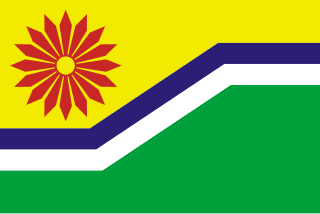
Mpumalanga is one of the nine provinces of South Africa. The name means "East", or literally "The Place Where the Sun Rises" in the Nguni languages. Mpumalanga lies in eastern South Africa, bordering Eswatini and Mozambique. It shares borders with the South African provinces of Limpopo to the north, Gauteng to the west, the Free State to the southwest, and KwaZulu-Natal to the south. The capital is Mbombela.

James Stevenson-Hamilton served from 1902–1946 as the first warden of South Africa's Sabi Nature Reserve, which was expanded under his watch and became Kruger National Park in 1926. The Tsonga people nicknamed him Skukuza because when he arrived at the area of the reserve he "turned everything upside down" with the banning of all hunting in the reserve and the relocation of all the native kraals. Skukuza camp and Skukuza Airport is named in honour of Stevenson-Hamilton, who is regarded as a champion of wildlife Conservation in South Africa.

Mala Mala is a game reserve located within the Sabi Sand Game Reserve, Mpumalanga province, South Africa. It is the largest and the oldest private big five game reserve in South Africa, It covers around 130 km2 or 15 000 hectares of land. In Xitsonga, the name Malamala means Kudu, it was named so because of the abundance of these animals within the game reserve. The Tsonga people, who occupied the land before the establishment of the game reserve, were forcibly removed from this land during the early 1900s and were dumped at Bushbuckridge. The Nwandlamhlarhi Community successfully claimed Malamala game reserve and the land was restored to them in 2015 when President Jacob Zuma handed them their land in a Government ceremony. The Tsonga people were also forcibly removed from neighbouring game reserves such as Skukuza, Satara, Ulusaba, Manyeleti, Protea Hotel Kruger Gate, Hoyo Hoyo Tsonga Lodge and may more in Southern Kruger. The Tsonga people are still waiting to be given back these lands by the Government after the finalization of their land claim.

Skukuza, a town in Mpumalanga located 57 km east of Hazyview at the confluence of the N'waswitshaka and Sabie Rivers, is the administrative headquarters of the Kruger National Park.
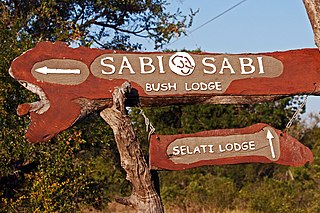
Sabi Sabi is a private game reserve in South Africa, situated in the Sabi Sand Game Reserve which flanks the south western section of the Kruger National Park. The Sabi Sand Reserve is one of the parks that make up the Greater Kruger National Park.

Timbavati Private Nature Reserve is a nature reserve on the western edge of Kruger National Park in Mpumalanga Province, South Africa. It was established in 1956 by like-minded game farmers with the creation of the Timbavati Association. The association has 50 members and covers 53,392 ha. Timbavati Private Nature Reserve harbours lions, cheetahs, African bush elephants.
The Mpumalanga Tourism and Parks Agency (MTPA) Board is a governmental organisation responsible for maintaining wilderness areas and public nature reserves in Mpumalanga Province, South Africa.

Balule Nature Reserve is a protected area in Limpopo Province, South Africa which forms part of the Greater Kruger National Park as a member of the Associated Private Nature Reserves (APNR). As part of a wildlife conservation initiative, all fences separating APNR reserves – Balule, Timbavati, Klaserie, Umbabat, – and the Kruger National Park have been removed.
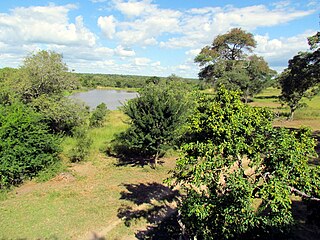
Djuma Game Reserve, is a 1,200 ha private game reserve, which is part of the Sabi Sand Game Reserve, Mpumalanga Province, South Africa. It is situated on the western border of the Kruger National Park, which together with some other parks make up the Greater Kruger National Park. The name Djuma refers to the roar of a lion.

Londolozi Private Game Reserve is a large game reserve, with 15 000 hectares ; 42 000 acres; 58 sq mi) of land in northeastern South Africa. This means 1 bed per 167 hectares of land. Londolozi Rangers are not bound by Kruger Park rules and can therefore drive off-road on safari and conduct comprehensive bush walks into the wilderness. The reserve is part of the Sabi Sand Private Game Reserve, situated on the western border of Kruger National Park, which together with some other parks make up the Great Limpopo Transfrontier Park. Londolozi is a Zulu word meaning "Protector of all Living Things". Wildlife in this reserve includes the Big Five of Africa.

Singita is a South African luxury ecotourism and conservation brand which operates private game lodges in South Africa, Zimbabwe, Tanzania, and Rwanda, across the Sabi Sand Game Reserve, Kruger National Park, Malilangwe Wildlife Reserve, Grumeti Game Reserve, Serengeti National Park, and Volcanoes National Park.

Ulusaba Private Game Reserve, owned by Sir Richard Branson as part of the Virgin Limited Edition luxury property portfolio, consists of about 13,500 ha of land set in the heart of the Sabi Sand Private Game Reserve. This private game reserve borders on the sprawling Kruger National Park in South Africa's Mpumalanga province and is home to an abundance of wildlife. Ulusaba means fearful in the local Tsonga (Shangaan) language and it was a name given to the Sabie River by the Shangaan people. The Sabie River was originally called Ulusaba by the Shangaan simply because there was once a large concentration of dangerous Nile crocodile in the river. Before the establishment of the Kruger National Park, Ulusaba was once a home of Tsonga-Shangaan people, the Shangaan were evicted from this land when the Kruger National Park was established and were relocated in nearby villages adjacent Ulusaba Private Game Reserve.
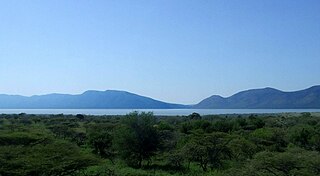
Pongolapoort Dam, commonly referred to as Jozini Dam creating Lake Jozini, is an arch type dam in northern KwaZulu-Natal, South Africa located on the Phongolo River. The dam is situated just north of the settlement of Jozini, 280 km north-east of the port city of Durban. The dam was constructed in 1973 at the eastern end of the narrow gorge separating the Lebombo and Ubombo ranges. The dam mainly serves for irrigation purposes and its hazard potential has been ranked high (3). The Phongolo River is the dam's largest feeder and outlet as well as the dam's only perennial feeder.
The Kruger National Park is a South African National Park and one of the largest game reserves in Africa. Originally known as The Sabi Game Reserve, it became a game reserve in 1898. The park became known as Kruger National Park in 1926, when it was named after Paul Kruger.

Lower Sabie is one of Kruger National Park's Main rest camps and is situated on the southern bank of the Sabie River, in the southeastern section of the park. It is connected to the main Skukuza camp by the H4-1 tarred road, which is often considered to be the busiest road in the park.

The Sand River is a river in the Mpumalanga lowveld flowing south-eastwards through the Sabi Sand Game Reserve for 50 km (31 mi) and joining the Sabie River 30 km (19 mi) east of Skukuza rest camp in the Kruger National Park.
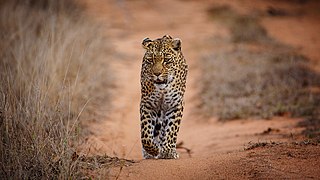
Sabi Sand Game Reserve is located adjacent to the Kruger National Park in the Lowveld of Mpumalanga, South Africa. Officially named Sabi Sand Wildtuin, the Sabi Sand Game Reserve consists of a group of private game reserves. The Newington Gate is at 24°52′9″S31°24′16″E and west of the Kruger Gate and Skukuza camp of Kruger Park. Other entrances are Gowrie Gate in the far north and Shaws Gate in the south.
The Mapogo lion coalition was a band of male South African lions that controlled the Sabi Sand region in Kruger National Park between 2006 and 2012. Researchers named the coalition for a brutal security company.
WildEarth is a British-South African broadcasting and conservation company primarily based at Djuma Game Reserve, part of the Sabi Sand Game Reserve in South Africa, who focus on connecting people with African Wildlife. The company is best known for its live drives, which take place twice a day in Sabi Sands and Pridelands. Former locations included Tswalu Kalahari, Karongwe Private Game Reserve, Phinda, Ngala and Arathusa.
















